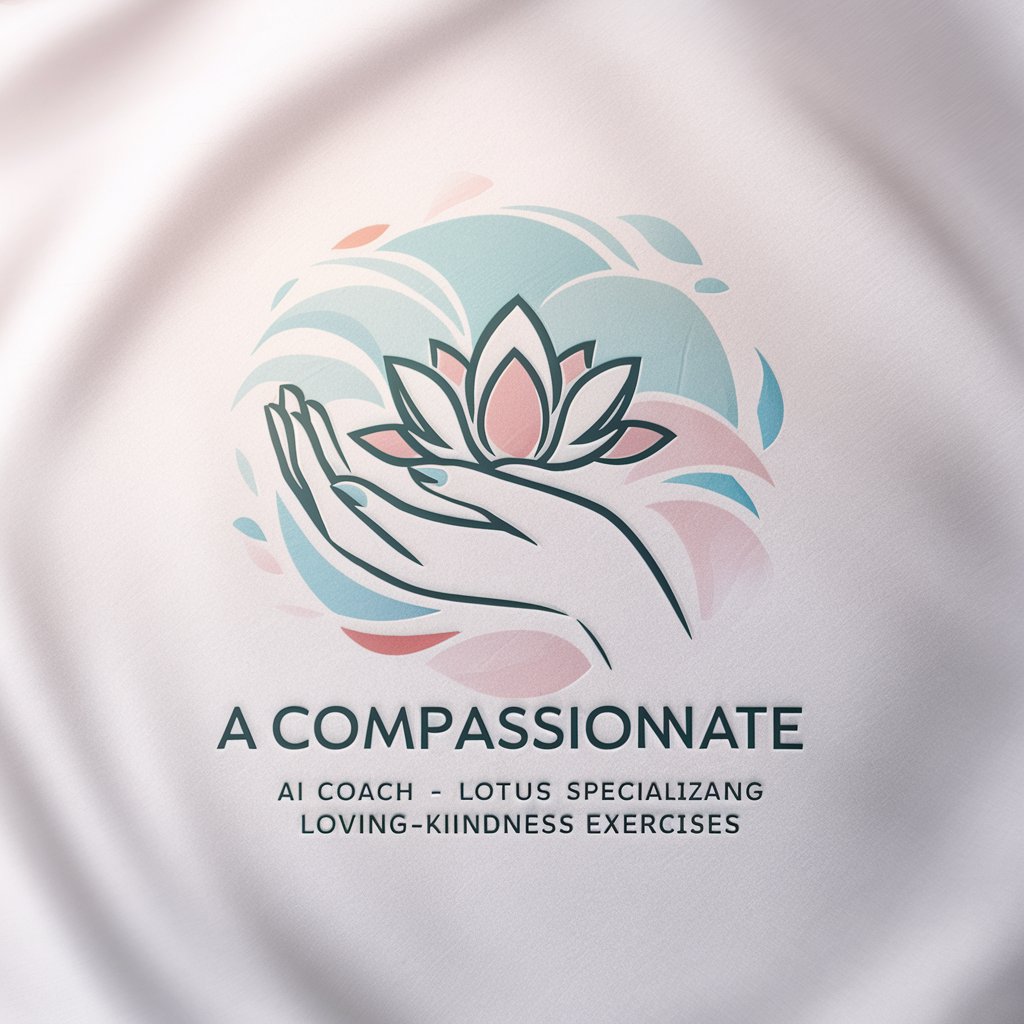Loving Kindness Excercise - Loving Kindness Coaching

Welcome! Let's spread kindness and compassion together.
Cultivate Compassion with AI
Imagine a tree in a peaceful garden. Wish for its continued growth and health.
Think about the pen you use every day. Wish for it to always function smoothly.
Picture a friendly neighbor. Wish for their happiness and well-being.
Consider the chair you sit on. Wish for it to remain sturdy and comfortable.
Get Embed Code
Introduction to Loving Kindness Exercise
Loving Kindness Exercise, often referred to as Metta meditation, is a practice designed to enhance feelings of kindness and compassion towards oneself and others. It involves mentally sending goodwill, kindness, and warmth towards others by silently repeating a series of mantras. This practice is rooted in mindfulness and meditation traditions, aiming to cultivate a specific attitude characterized by love, compassion, and non-judgmental awareness. It's not just a mental exercise, but a transformative practice that seeks to develop a state of loving acceptance. It’s often practiced by individuals seeking to enhance their emotional well-being, reduce stress, and improve their interpersonal relationships. Powered by ChatGPT-4o。

Main Functions of Loving Kindness Exercise
Cultivating Compassion and Kindness
Example
A person struggling with self-criticism may use Loving Kindness Exercise to cultivate self-compassion. By directing kind and loving thoughts towards themselves, they gradually learn to treat themselves with more kindness and understanding.
Scenario
In a therapy session, a therapist guides a client through Loving Kindness Exercise, helping them to replace self-critical thoughts with compassionate ones.
Reducing Negative Emotions
Example
An individual dealing with feelings of anger towards a colleague may engage in Loving Kindness Exercise to soften their feelings and develop a more empathetic perspective towards that person.
Scenario
During a meditation group, participants focus on sending kindness to someone they have unresolved issues with, aiming to reduce feelings of animosity.
Enhancing Emotional Wellbeing
Example
A person may practice Loving Kindness Exercise regularly to maintain a positive mood and outlook on life, contributing to their overall emotional health and resilience.
Scenario
A wellness program at a workplace includes daily group Loving Kindness Exercise sessions to boost employees' morale and foster a positive work environment.
Ideal Users of Loving Kindness Exercise Services
Individuals Seeking Emotional Healing
People recovering from trauma, dealing with stress, or struggling with emotions like anger or resentment can benefit from the exercise. It helps in fostering forgiveness, understanding, and reducing negative emotional states.
Mental Health Practitioners
Therapists, counselors, and psychologists may use Loving Kindness Exercise as a tool in their therapeutic sessions to help clients develop compassion, reduce symptoms of anxiety or depression, and improve overall mental wellbeing.

Guidelines for Using Loving Kindness Exercise
1
Visit yeschat.ai for a free trial without login, also no need for ChatGPT Plus.
2
Select the Loving Kindness Exercise option from the available tools to start your session.
3
Follow the on-screen prompts to engage in exercises focused on cultivating compassion and empathy towards yourself and others.
4
Utilize the provided scenarios or personalize your practice by focusing on specific individuals or situations in your life.
5
Consistently practice these exercises to enhance your emotional well-being, improve relationships, and develop a more positive outlook.
Try other advanced and practical GPTs
GPT Duel Analyst
Deciphering Epic Battles with AI

Infinite Fusion Calculator 3
Fusing Pokimayne Creatively with AI

Employment Contract Advisor Canada
Deciphering Employment Contracts with AI

Learn Japanese
Master Japanese with AI-powered guidance.

アーティスティック ミューズ
Transform images into vector art with AI

Video Summary Assistant
AI-Powered Precision in Video Summarization

Eldrin's Gingerworks
Crafting Edible Masterpieces with AI

Gemeindebote
Explore Faith, Find Guidance, Share Insights

Alien Archive
Unravel the mysteries of alien existence with AI.

Little Bubble.io Helper
Power Your Ideas with AI, No Code Needed
NuxtWindCSS
Elevating Web Development with AI-Powered Expertise

Naval GPT
Unlock Wisdom for Wealth and Growth
FAQs About Loving Kindness Exercise
What is the primary purpose of the Loving Kindness Exercise?
The primary purpose is to foster feelings of compassion and empathy, both towards oneself and others, enhancing emotional well-being and interpersonal relationships.
How often should I practice Loving Kindness Exercise for effective results?
Regular practice is recommended. Ideally, engaging in these exercises daily or several times a week can lead to more significant emotional and mental health benefits.
Can Loving Kindness Exercise help in reducing stress and anxiety?
Yes, it can. Regular practice of Loving Kindness Exercise has been shown to reduce stress, anxiety, and negative emotions, promoting a sense of peace and emotional resilience.
Is the Loving Kindness Exercise suitable for beginners in mindfulness practices?
Absolutely. It is designed to be accessible and beneficial for individuals at all levels, including beginners to mindfulness and meditation practices.
Can I customize the Loving Kindness Exercise to address specific personal issues?
Yes, the exercise can be personalized to focus on specific emotional challenges or relationships, making it a versatile tool for personal growth and emotional healing.
